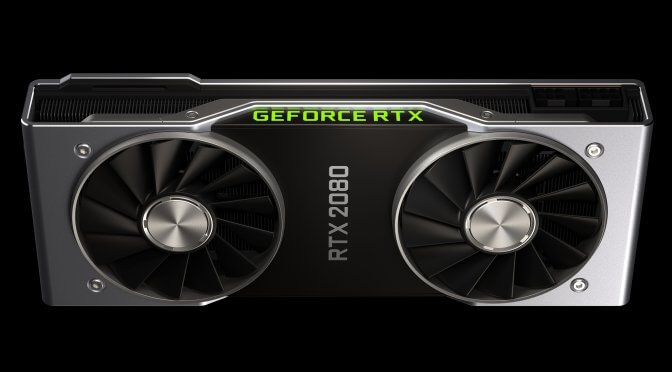The official UK website for NVIDIA has revealed the prices and full specifications for both the NVIDIA GeForce RTX 2080 and the NVIDIA GeForce RTX 2080Ti. The first GPU will be priced at $799 whereas the Ti version will be priced – wait for it – at $1199. Both of these graphics cards will come with dual fans as shown in our header image.
The GeForce RTX 2080Ti will feature 352-bit memory and 11GB of GDDR6 that will be clocked at 14 Gbps, and will pack 4352 CUDA cores, and will theoretically offer a maximum bandwidth of 616 GB/s. The Founder’s Edition will be clocked at 1350Mhz and can be turbo boosted at 1635Mhz.
On the other hand, the GeForce RTX 2080 will feature 256-bit memory and 8GB of GDDR6, will come with 2944 CUDA cores and will theoretically offer a maximum bandwidth of 448 GB/s. Its base clock will be at 1515Mhz and its Founder’s Edition can be turbo boosted at 1800Mhz.
Last but not least, here are the full PC specs for the NVIDIA GeForce RTX 2070 (which will be priced starting at $599)!
UPDATE:
The NVIDIA GeForce RTX 2080Ti, RTX 2080 and RTX 2070 will be available on September 20th and are currently available for pre-orders. Moreover, NVIDIA announced that the RTX 2080Ti will be available from $999 and the RTX 2080 will be available from $699. HOWEVER, do note that the Founder’s Editions for RTX 2080Ti, RTX 2080 and RTX 2070 are available at the prices we previously mentioned ($1199, $799 and $599). This is the price you’ll pay when you try to pre-order these graphics cards from NVIDIA’s official website store.

John is the founder and Editor in Chief at DSOGaming. He is a PC gaming fan and highly supports the modding and indie communities. Before creating DSOGaming, John worked on numerous gaming websites. While he is a die-hard PC gamer, his gaming roots can be found on consoles. John loved – and still does – the 16-bit consoles, and considers SNES to be one of the best consoles. Still, the PC platform won him over consoles. That was mainly due to 3DFX and its iconic dedicated 3D accelerator graphics card, Voodoo 2. John has also written a higher degree thesis on the “The Evolution of PC graphics cards.”
Contact: Email




